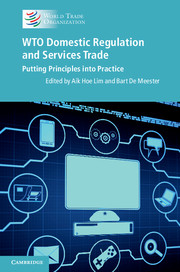Book contents
- Frontmatter
- Contents
- List of contributors
- Foreword
- Disclaimer
- Acknowledgements
- List of abbreviations
- 1 An introduction to domestic regulation and GATS
- Part I Impediments to services trade, regulatory theory and principles
- Part II Legal perspectives on WTO principles and domestic regulations
- Part III Case studies
- Part IV Concluding remarks
- 19 Services liberalization, negotiations and regulation: some lessons from the GATS experience
- 20 Addressing the domestic regulation and services trade interface: reflections on the way ahead
- Index
19 - Services liberalization, negotiations and regulation: some lessons from the GATS experience
Published online by Cambridge University Press: 05 April 2014
- Frontmatter
- Contents
- List of contributors
- Foreword
- Disclaimer
- Acknowledgements
- List of abbreviations
- 1 An introduction to domestic regulation and GATS
- Part I Impediments to services trade, regulatory theory and principles
- Part II Legal perspectives on WTO principles and domestic regulations
- Part III Case studies
- Part IV Concluding remarks
- 19 Services liberalization, negotiations and regulation: some lessons from the GATS experience
- 20 Addressing the domestic regulation and services trade interface: reflections on the way ahead
- Index
Summary
Introduction
The services economy has been undergoing a major transformation over the last three decades, moving away from the old model, where services were more often than not government functions provided by public utility entities, towards a new paradigm of private, sector-led, competitive markets, where services are exchanged on a commercial basis. Accordingly, the role of governments has fundamentally changed in many activities from being the provider of the service into that of the supervisor or regulator in pursuit of public interests. Increasingly, services markets continue to be liberalized, motivated by the usual gains from competition (better quality, lower prices, wider choices, expanding markets and more job creation).
The General Agreement on Trade in Services (GATS) is the international community’s response to the transformation (or paradigm shift) in the services sector. It provides a legal framework that institutionalizes concepts for a new form of international trade, through the four modes of supply. Rather than triggering the process of liberalization, it was seen as a rules-based framework for international cooperation in the field of trade in services, consolidating liberalizing steps, and as a multilateral antidote to backsliding in national policies (the role of policy commitments).
- Type
- Chapter
- Information
- WTO Domestic Regulation and Services TradePutting Principles into Practice, pp. 325 - 331Publisher: Cambridge University PressPrint publication year: 2014



